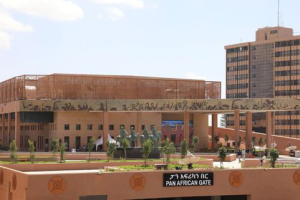Following the successful and historic sixth national general election held last June, many Ethiopians are optimistic about the next parliament which will be formed on October 04, 2021. The lawmakers are expected to work for the common good of their consistencies.
The duties of members of the House of Peoples’ Representatives of Federal Democratic Republic of Ethiopia (FDRE) are briefly stipulated in the country’s Constitution and House’s Rules of Procedures and Members’ Code of Conduct.
Article 54 (4) of the FDRE Constitution stipulates that members of the House are governed by the constitution of the country, the will of the people, and their conscience.
Before the national reform begun in 2018, MPs had been criticized for failing to discharge their constitutional responsibilities while there was problem of good governance, project delays, and widespread embezzlement. They were also lambasted for failing to fulfill their responsibility as required in terms of efficiently overseeing the activities of sector institutions and executive bodies. They were loyal to their party instead of being a true representative of their electorate and discussing important national issues. MPs also had been passing repressive laws that go against the Constitution.
However, since the coming of Prime Minister Abiy Ahmed (PhD) into power in April 2018, various commendable works have been done to reform the House and give more freedom to MPs. The draconian anti-terrorism law, media law, investment law, and others have been amended to foster socioeconomic and political wellbeing of the country. No one also denies that there has been relative freedom for MPs in the past three years, even though it was not enough.
The outgoing members of the House previously approached by The Ethiopian Herald stated that the House has done many encouraging works since 2018.
The parliamentarians were passive and they were not discharging their constitutional responsibilities properly, said the outgoing MP Taddesse Messelu. He added that, in various discussion forums, MPs were challenging the executive body, but, the public could not find out the truth as such discussion forums were denied media coverage.
However, he said, various encouraging works have been done within the past three years because of the reform put place by the new leadership. There was also relative freedom for the media institutions. The discussions of lawmakers have got media coverage, he stated.
He further indicated that various changes have been made by the House as the interference of the executive body in the activities of the House has been eliminated. And also, various repressive laws have been amended. “Since the last three years, MPs have been exercising their constitutional rights properly.”
According to him, MPs were able to raise their opinion freely without fear. There has been no party discipline in the last three years. When the party discipline was eliminated, MPs began to come up with ideas that would benefit the country and the people.
He further opined that members of the new parliament that will be formed in early October are better educated and more experienced than the previous ones. “I am sure that there will be good things. This needs the commitment of the executive body including the Premier,” he indicated.
He also urged that the executive should be supportive of the House’s work, not obstructing it. The newly elected members of the House should also be very careful when approving. The legislative process of the House should involve the concerning bodies as well as the public. And also, MPs have to oversee the activities of the executive body properly. “They must be ready to sacrifice even their lives to protect the interests of the country and the people.”
Another outgoing MP Abebe Godebo for his part said that it is important to categorize the activities of the House within the past six years – before and after the reform. In the first three years [before the reform] there was the influence of the executive body, and the MPs were trying to break free from the pressure, but these struggles were not well known to the public due to the lack of media coverage at that time, he added.
However, he stated, in the last three years, many inspiring works have been done by the House in terms of making laws, supervising the executive, and representing the electorate.
As everyone knows, before the national reform, the legislative process of the House had problems. MPs were being forced to approve the law that the executive body needed, he opined.
According to him, after the national reform has begun, the legislative process has been involving the stakeholders and the public by organizing public discussion forums, according to him. “As a result, many laws that will benefit the country and the people have been enacted and approved.”
He also noted that many repressive laws like election proclamation, civic societies’ organization law, and anti-terrorism law have been amended. The Ethiopian Human Rights Commission and Ombudsman Office have been reorganized to improve their engagement. These laws have been accepted by the people and the legislative process has given the people confidence in the activities of the House, as to him.
He also stated that since the last three years, MPs have also been expressing their opinions without any fear as the party discipline that prohibited them from exercising their constitutional rights has been eliminated.
Abebe further opined that the work done by the House may not be enough depends on the needs of the people, but, they will be a good foundation for the new parliament.
He said, “I hope that the newly elected MPs do a better job than ever before as they are democratically elected representatives of the people and have better experience and education than before.”
He also stated that he thinks the members of the new parliament will work for the benefit of the country, the people, and for the protection of the country’s sovereignty.
“Unlike the previous, various ideas that will benefit the country and the people will be entertained as there are the representatives of opposition political parties even though they are small in number,” said Mehandis Melaku, outgoing MP.
He also stated that there is relative freedom and enabling situations for the newly elected members of the House to discharge their constitutional responsibilities properly.
He further urged that the newly elected members of the House have to work hard to ensure the unity of Ethiopians. And, they should be very farsighted and focus on big and national issues instead of discussing very local and divisive issues, he insisted.
The legislative process should involve the public and other stakeholders, he insisted. Not only making laws, he added, but MPs should monitor the implementation of the laws.
The newly suggested structure of the Office, which taken into account the needs and capacity of the country, is expected to enable the House to work effectively by modernizing itself, according to the presenters of the study.
It was revealed that the proposed study provides an in-depth look at the work of the Secretariat Office structure and it will help to bridge the gaps in the current office structure. The organizational structure alone will not be effective and the House should be supported by qualified professionals, it was said.
BY ABDUREZAK MOHAMMED
ETHIOPIAN HERALD 19 SEPTEMBER 2021





